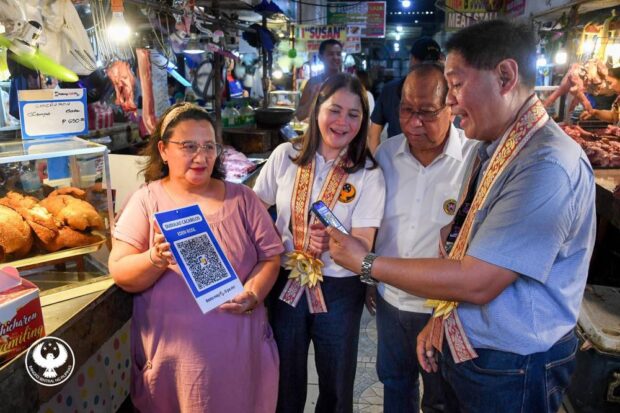PH moving closer to ‘cash-lite’ dream

PROMOTING PALENG-QR Bernadette Romulo-Puyat, Bangko Sentral ng Pilipinas deputy governor (second from left), Tarlac Vice Governor Carlito David and Camiling Mayor Erlon Agustin at the Camiling Public Market on May 19, 2023. Tarlac is the first province to join Paleng-QR Ph Plus, the national interoperable standard for QR code payments. —BSP PHOTO
Lorna Ortiz and Gloria Santiago, merchants at Carmona Public Market in Cavite, are raving about the benefits of the Paleng-QR Ph Plus, a digital payment initiative of the Bangko Sentral ng Pilipinas (BSP) that seeks to promote cashless payments in public markets and local transportation, particularly tricycles.
“Nearly all vendors here in Carmona are using QR Ph codes. It is seamless, cashless, and directly credits my online transactions to my bank or e-wallet account,” Ortiz says.
Santiago shares the same view. “My past challenges in handling payments and transactions have been addressed,” she says.
The two public market vendors’ positive assessment proves how the BSP is gaining traction in its bid to promote digital payments. In 2013, the Philippines started with just 1-percent share of digital transactions to total retail payments. Fast forward to 2022, the country has seen a 42.1-percent share in digital retail payments.
BSP’s ambitious goal
Last year, the BSP set a more ambitious goal to shift half of national total retail payments to digital channels. That target is complemented with another goal to raise the ranks of adult Filipinos with bank accounts to 70 percent.
The central bank has yet to publish its accomplishment report, but Deputy Governor Mamerto Tangonan has declared that the BSP likely hit the digital payments goal.
There’s also a chance that the central bank will outdo itself this year, if the projection by Philippine-based fintech startup Mochi is to be believed.
Mochi forecasts that 67 percent of retail payments in the country will be digital in 2024. The company says the prediction is derived from the 43-percent average year-on-year growth rate of digital retail payments from 2019 to 2022, based on data released by the BSP, while also considering the postpandemic slowdown of that growth rate.
Strong adoption of digital solutions, growth of the small-to-medium enterprise (SME) sector and the postpandemic effect are seen as drivers of this rise in digital payments, Mochi explains.
‘Blockers’
“Digital payments remained strong postpandemic despite the slowdown,” says Guaya Melgar, CEO and cofounder of Mochi and financial sector specialist at the World Bank.
But Mochi warns that the rapid shift to digital retail payments may cause some problems for small businesses, especially those who may not keep up with the changes and the accompanying risks.
“This steady rise in digital payments is also seen as a potential blocker to the growth of SMEs. With more digital payments comes the need for SMEs to properly process and manage them to avoid fraud, miscalculations and productivity bottlenecks,” the company says.
“Digitizing invoices is one effective way to minimize the risk of mishandling digital payments,” it adds.
Mochi is an accounts receivable platform that helps Filipino businesses streamline billing and collections, as well as reduce error and fraud.
The Paleng-QR Ph Plus program is just one of several digital payment initiatives by the BSP.
More programs
The central bank has also launched the “Bills Pay Ph” to unify the fragmented local bills payment system, and allow users to settle their bills whether or not they have an account with their billers’ payment service provider.
This initiative has two objectives: to streamline financial processes and to bridge the gap between those with and without access to financial services. Through these digital payment facilities, the BSP says an even greater portion of the population can now actively participate in the formal economy.
“With more than 90 percent of businesses in the Philippines being small businesses, it’s no wonder they’ve become champions of the digitization of financial services,” Mochi’s Melgar adds.
